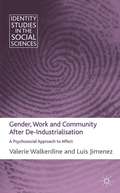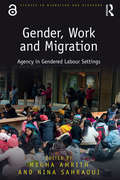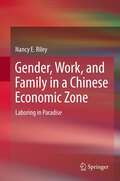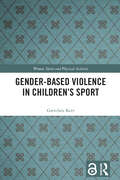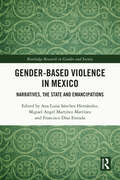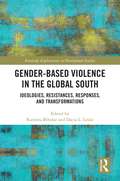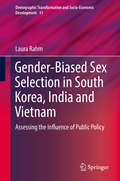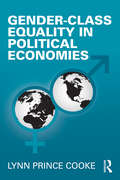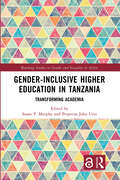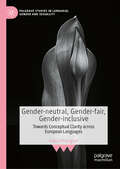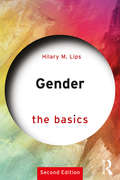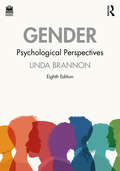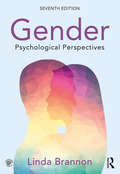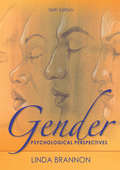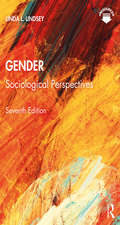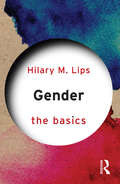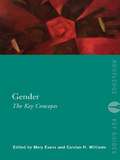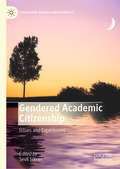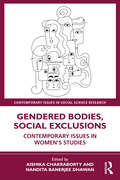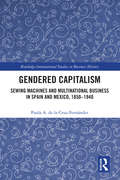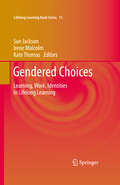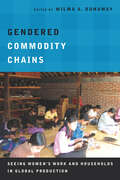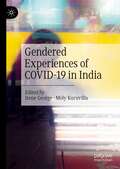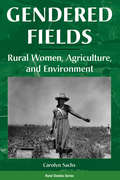- Table View
- List View
Gender, Work and Community After De-Industrialisation
by Valerie Walkerdine Luis JimenezHow does an industrial community cope when they are told that closure is inevitable? What if this is only the last in a 200 year long line of threats, insecurities and closure? How did people weather the storms and how do they face the future now? While attempts to regenerate communities are everywhere, we do not often hear from the people themselves just how they managed to create safe collective spaces or how the fall of the whole house of cards brought with it effects which can be felt by young people who never knew the town when it was an industrial heartland. We hear the story of how men and women tried to cope and still want to retain their community in the face of its destruction. What can they and will they have to pass to the next generation and where will that leave the young people themselves, who have nothing to stay for but are unable to leave? This book examines these crucial questions facing post-industrial societies.
Gender, Work and Migration: Agency in Gendered Labour Settings (Studies in Migration and Diaspora)
by Megha Amrith Nina SahraouiWhile the feminisation of transnational migrant labour is now a firmly ingrained feature of the contemporary global economy, the specific experiences and understandings of labour in a range of gendered sectors of global and regional labour markets still require comparative and ethnographic attention. This book adopts a particular focus on migrants employed in sectors of the economy that are typically regarded as marginal or precarious – domestic work and care work in private homes and institutional settings, cleaning work in hospitals, call centre labour, informal trade – with the goal of understanding the aspirations and mobilities of migrants and their families across generations in relation to questions of gender and labour. Bringing together rich, fieldwork-based case studies on the experiences of migrants from the Philippines, Bolivia, Ecuador, Zimbabwe, Mozambique, Mauritius, Brazil and India, among others, who live and work in countries within Europe, Asia, the Middle East and South America, Gender, Work and Migration goes beyond a unique focus on migration to explore the implications of gendered labour patterns for migrants’ empowerment and experiences of social mobility and immobility, their transnational involvement, and wider familial and social relationships.
Gender, Work, and Family in a Chinese Economic Zone
by Nancy E RileyThis book examines the dynamics of power within the families of married women who have migrated from rural areas to China's Dalian Economic Zone. Engaging the question of whether waged work gives women power in their families, this ethnographic study finds that women do indeed use their new positions and urban status to negotiate their family status. However, women use these new resources not necessarily to promote their own individual liberation, but rather to strengthen their contribution as wives and, especially, as mothers. Thus, this new modernity provides a space for the re-inscribing of traditional roles, even as it may work to give women new-found power within their families. How and why this process occurs is related to the dual inequalities these women face as rural migrants and as women.
Gender-Based Violence in Children’s Sport (Women, Sport and Physical Activity)
by Gretchen KerrThis book addresses the major forms of Gender-Based Violence (GBV) in children’s sport, including sexual, physical, and psychological violence and neglect. It reviews the historical, sociocultural, and political influences on violence towards children, and sets out future agendas for research and practice to eliminate GBV in sport. The book argues that for GBV to occur and be sustained over time, it must be facilitated by a system that enables this violence, protects the perpetrator, disables bystanders, silences the victims, and/or fails to provide a structure by which to address victims’ or bystanders’ concerns. Drawing on empirical research from across a range of disciplines, including sport sociology, sport psychology, developmental psychology, and coaching, and examining real life case studies of GBV in sport at all levels, the book makes a powerful case for radical change in our current systems of sport governance, safeguarding, and athlete welfare. This is important reading for any student, researcher, policy-maker, coach, welfare officer or counsellor with an interest in sport, gender studies, safeguarding, criminology, or sociology. An electronic version of this book is freely available, thanks to the support of libraries working with Knowledge Unlatched (KU). KU is a collaborative initiative designed to make high quality books Open Access for the public good. The Open Access ISBN for this book is 9781003035138. More information about the initiative and links to the Open Access version can be found at www.knowledgeunlatched.org.
Gender-Based Violence in Mexico: Narratives, the State and Emancipations (Routledge Research in Gender and Society)
by Martínez Martínez, Miguel Angel Francisco Díaz EstradaThis book examines the roots of systemic aggression against women in contemporary Mexico, and the connection between social practices and the institutional permissiveness of the Mexican State with regard to gendered violence. Since the democratic transition at the end of the 1990s, Mexico has registered an increase in the intensity and types of violence that have made life in some regions almost unsustainable. The chapters in this volume consider that capitalism, colonialism and patriarchy are interrelated processes that employ the technologies of gender and race as a continuation of the symbolic hegemony that treats feminized and racialized bodies as disposable. Against this background, it becomes necessary to understand from different dimensions the systemic violence against women as well as the processes of articulation between social practices and the permissiveness of the State in the face of aggression. Gender-Based Violence in Mexico mobilizes a dialogue between writings, fields of knowledge, causes and situations as essential tools for the struggle against gender violence. As a situated work that underlines the systematic roots of the violence that keeps women in subaltern positions, the text seeks an insurrection, an uprising of the bodies that invite naming the abject, peripheral and unseen populations of the project of globalized life, woven by the obsession of success and prestige. It presents a counter-conclusion in the manner of a beginning in the desire to elaborate counter-political and counter-pedagogical strategies of non-coercive experiences, where questions and debates are not a sign of belligerence but of vitality and care for the body-territories. Gender-Based Violence in Mexico will appeal to scholars of sociology, criminology, gender and Latin American studies with interests in gendered violence and injustice.
Gender-Based Violence in the Global South: Ideologies, Resistances, Responses, and Transformations (Routledge Explorations in Development Studies)
by Dacia L. LeslieThis book amplifies the different voices and experiences of those facing gender-based violence (GBV) in the Global South. It explores the localised ways in which marginalised individuals design modes of coping with and address GBV, including cultural interpretations, and artistic and faith-based expressions.The book examines GBV triggers, prevalence, and societal impacts while referring to community, national, and regional mobilisation to deal with the phenomenon in its various manifestations, including physical, psychological, political, domestic, and public violence. It explores issues related to women’s negotiations with the patriarchal underpinnings of GBV; the role of the law and history in the perpetuation of GBV; the complementary role of culture and faith to legal protection against GBV, and access to justice for women and girls. In doing so, the book exposes understandings and expressions of GBV, as well as methodologies and indigenous initiatives to prevent it through local viable solutions. The book thus challenges the normalisation of GBV in the Global South.Providing concrete and culturally relevant suggestions for challenging ingrained models of gender understandings of violence in the Global South, this book will be of interest to academics in the fields of Development Studies, Gender Studies, Women’s Studies, Violence and Abuse Studies, Human Rights, Criminal Law, and Socio-Legal Studies.
Gender-Biased Sex Selection in South Korea, India and Vietnam: Assessing the Influence of Public Policy (Demographic Transformation and Socio-Economic Development #11)
by Laura RahmThis book provides an in-depth analysis of the influence of public policy on sex selection. Three Asian countries were chosen for the comparative policy analysis, namely South Korea, India and Vietnam that share in common a historical legacy of son preference, high levels of sex imbalances and active policy response to curbing the growing demographic masculinization of their nations. The research based on the data collected from field work in the three countries shows that despite the adoption of very similar anti-sex selection policies the outcomes have been markedly different for each of the three countries. These unexpected diverse outcomes are explained partly by their different historical and cultural contexts, and partly to the different social, political and economic institutions and dynamics. This monograph offers careful and detailed explanations of both within and across country diversities in policy outcomes, pointing to the importance and the limits of cross-national policy learning and adoption, and raising questions about the efficacy of international organizations’ current approaches to global policy and knowledge transfer.
Gender-Class Equality in Political Economies (Perspectives on Gender)
by Lynn Prince CookeGender-Class Equality in Political Economies offers an in-depth analysis of gender-class equality across six countries to reveal why gender-class equality in paid and unpaid work remains elusive, and what more policy might do to achieve better social and economic outcomes. This book is the first to meld cross-time with cross-country comparisons, link macro structures to micro behavior, and connect class with gender dynamics to yield fresh insights into where we are on the road to gender equality, why it varies across industrialized countries, and the barriers to further progress.
Gender-Inclusive Higher Education in Tanzania: Transforming Academia (Routledge Studies on Gender and Sexuality in Africa)
by Susan P. Murphy Perpetua John UrioWhilst there is an extensive body of research exploring the barriers to gender equality and female empowerment in high-income states, there are far fewer systematic analyses within lower-income settings. This book draws on extensive empirical data to analyse gender mainstreaming and gender transformative actions in Tanzanian higher education.The book maps the practical landscape of gender mainstreaming across 14 universities in Tanzania, and the theoretical landscape of African theories of masculinities and femininities underpinning educational institutions and practices. It then assesses the Gender Awareness and Transformation through Education project, which was designed to support the development of gender expertise and capacities in research and education at one specific institution, across both its administrative and academic units. Current and future academics at Dar es Salaam University College of Education were trained in gender-based research and education, and a strategic plan was developed to guide in the establishment of a Gender Research Centre that will provide gender expertise in research and teaching to the College; and, over time, to other HEIs nationally and regionally. By bringing together real-world insights from action-based research, the book demonstrates the impact of real-time social change and gender transformation, with implications both for Tanzania and beyond.Bringing novel empirical insights and policy recommendations, this book will be of interest to researchers and policy makers across the fields of gender studies, education, and African studies.
Gender-neutral, Gender-fair, Gender-inclusive: Towards Conceptual Clarity across European Languages (Palgrave Studies in Language, Gender and Sexuality)
by Falco PfalzgrafThis edited book explores the ambiguity and overlap in the usage of terms such as &“gender-inclusive&”, &“gender-fair&”, and &“gender-neutral&” across various disciplines and languages, aiming to achieve conceptual clarity and advocate for standardisation. The authors examine different aspects of gender-inclusivity in European languages including Dutch, English, French, German, Italian, Polish, Romanian, Spanish, and Swedish. This book will be of interest to students and scholars of fields such as Linguistics, Psychology, Anthropology, and Cultural Studies.
Gender: 2nd edition (The Basics)
by Hilary M. LipsGender: The Basics is an engaging introduction to the influence of cultural, historical, biological, psychological, and economic forces on ways in which we have come to define and experience femininity and masculinity, and on the impact and importance of gender categories. Highlighting that there is far more to gender than biological sex, it examines theories and research about how and why gender categories and identities are developed and about how interpersonal and societal power relationships are gendered. It takes a global and intersectional perspective to examine the interaction between gender and a wide range of topics including: Relationships, intimacy, and concepts of sexuality across the lifespan The workplace and labour markets Gender related violence and war Public health, poverty, and development Gender and public leadership This new edition includes increased coverage of trans visibility and activism, LGBTQ studies and critical masculinity studies, global developments in women’s political leadership, links between gender and economic wellbeing, and cyberbullying. Supporting theory with examples and case studies from a variety of contexts, suggestions for further reading, and a detailed glossary, this text is an essential read for anyone approaching the study of gender for the first time.
Gender: Psychological Perspectives
by Linda BrannonThis fully updated and revised eighth edition examines the behavioral, biological, and social context in which people express gendered behaviors, utilizing the latest research to help students think critically about research findings and stereotypes and provoking them to examine and revise their own preconceptions.The text’s unique pedagogical program helps students understand the portrayal of gender in the media and the application of gender research in the real world. Headlines from the news open each chapter; Gendered Voices present true personal accounts of people’s lives; According to the Media boxes highlight gender-related coverage in newspapers, magazines, books, TV, and movies; while According to the Research boxes offer the latest scientifically based research to help students analyze the accuracy and fairness of gender images presented in the media. Additionally, Considering Diversity sections emphasize the cross-cultural perspective of gender.Key features of the new edition include Expanded discussion of transgender and non-binary identities 12 new headline articles including topics ranging from the myth of biological sex to the wars over sex education and the factors involved in the gender pay gap Comprehensive digital resources with content for instructors and students. Intended for undergraduate or graduate courses on the psychology of gender, psychology of sex, gender issues, women in society, and women’s or men’s studies, this book is also applicable to sociology and anthropology courses on diversity.
Gender: Psychological Perspectives, Seventh Edition
by Linda BrannonGender: Psychological Perspectives synthesizes the latest research on gender to help students think critically about the differences between research findings and stereotypes, provoking them to examine and revise their own preconceptions. The text examines the behavioral, biological, and social context in which women and men express gendered behaviors. The text’s unique pedagogical program helps students understand the portrayal of gender in the media and the application of gender research in the real world. Headlines from the news open each chapter to engage the reader. Gendered Voices present true personal accounts of people's lives. According to the Media boxes highlight gender-related coverage in newspapers, magazines, books, TV, and movies, while According to the Research boxes offer the latest scientifically based research to help students analyze the accuracy and fairness of gender images presented in the media. Additionally, Considering Diversity sections emphasize the cross-cultural perspective of gender. This text is intended for undergraduate or graduate courses on the psychology of gender, psychology of sex, psychology of women or men, gender issues, sex roles, women in society, and women’s or men’s studies. It is also applicable to sociology and anthropology courses on diversity. Seventh Edition Highlights: 12 new headlines on topics ranging from gender and the Flynn effect to gender stereotyping that affects men Coverage of gender issues in aging adults and transgendered individuals Expanded coverage of diversity issues in the US and around the globe, including the latest research from China, Japan, and Europe More tables, figures, and photos to provide summaries of text in an easy-to-absorb format End-of-chapter summaries and glossary Suggested readings for further exploration of chapter topics Companion website at www.routledge.com/cw/Brannon containing both instructor and student resources
Gender: Psychological Perspectives, Sixth Edition
by Linda BrannonThis bestselling text presents research about gender and helps students think critically about the differences between research findings and gender stereotypes. It examines the biology and social context in which women and men express gendered behaviors. Defining gender as the behaviors and attitudes that relate to (but are not entirely congruent with) biological sex, the book focuses on research and scholarship to provide the material for a critical review and an overall picture of gender from a psychological perspective. To highlight how research findings can relate to people's lives, the book supplements the review of scholarly research with personal, narrative accounts of gender-relevant aspects of people's lives. To emphasize the cross-cultural perspective of gender, the book including a section on diversity in most chapters but also weaves diversity issues throughout the text. The personal narrative and diversity highlights help to balance the research-based scholarship with the personal experience of gender.
Gender: Sociological Perspectives
by Linda L. LindseyA landmark publication in the social sciences, Linda Lindsey’s Gender is the most comprehensive textbook to explore gender sociologically, as a critical and fundamental dimension of a person’s identity, interactions, development, and role and status in society. Ranging in scope from the everyday lived experiences of individuals to the complex patterns and structures of gender that are produced by institutions in our global society, the book reveals how understandings of gender vary across time and place and shift along the intersecting lines of race, ethnicity, culture, sexuality, class and religion. Arriving at a time of enormous social change, the new, seventh edition extends its rigorous, theoretical approach to reflect on recent events and issues with insights that challenge conventional thought about the gender binary and the stereotypes that result. Recent and emerging topics that are investigated include the #MeToo and LGBTQ-rights movements, political misogyny in the Trump era, norms of masculinity, marriage and family formation, resurgent feminist activism and praxis, the gendered workplace, and profound consequences of neoliberal globalization. Enriching its sociological approach with interdisciplinary insight from feminist, biological, psychological, historical, and anthropological perspectives, the new edition of Gender provides a balanced and broad approach with readable, dynamic content that furthers student understanding, both of the importance of gender and how it shapes individual trajectories and social processes in the U.S. and across the globe.
Gender: The Basics
by Hilary LipsGender: The Basics is an engaging introduction which examines the impact of cultural, historical, biological, psychological and economic forces on qualities which have come to be defined as masculine or feminine. Highlighting that there is far more to gender than biological sex, it takes a global perspective to examine the interaction between gender and a wide range of topics including: • Relationships, intimacy and concepts of sexuality • The workplace and labour markets • Gender related violence and war • Public health, poverty and development • The ageing process Supporting theory with examples and case studies from a variety of contexts, suggestions for further reading and a detailed glossary, this text is an essential read for anyone approaching the study of gender for the first time.
Gender: The Key Concepts (Routledge Key Guides)
by Mary Evans Carolyn H. WilliamsThis invaluable volume provides an overview of 37 terms, theories and concepts frequently used in gender studies which those studying the subject can find difficult to grasp. Each entry provides a critical definition of the concept, examining the background to the idea, its usage and the major figures associated with the term. Taking a truly interdisciplinary and global view of gender studies, concepts covered include: Agency Diaspora Heteronormativity Subjectivity Performativity Class Feminist Politics Body Gender identity Reflexivity. With cross referencing and further reading provided throughout the text, Gender: The Key Concepts unweaves the relationships between different aspects of the field defined as gender studies, and is essential for all those studying gender in interdisciplinary contexts as undergraduates, postgraduates and beyond.
Gendered Academic Citizenship: Issues and Experiences (Citizenship, Gender and Diversity)
by Sevil SümerThis book proposes the framework of gendered academic citizenship to capture the multidimensional and complex dynamics of power relations and everyday practices in the contemporary context of academic capitalism. The book proposes an innovative definition of academic citizenship as involving three key components: membership, recognition and belonging. Based on new empirical data, it identifies four ideal-types of academic citizenship: full, limited, transitional citizenship and non-citizenship. The different chapters of the book provide comprehensive reviews of the relevant research literature and offer original insights into the patterns of gender inequalities and practices of gendered academic citizenship across and within different national contexts. The book concludes by setting a comprehensive research agenda for the future. This book will be of interest to academic researchers and students at all levels in the disciplines of sociology, gender studies, higher education, political science and cultural anthropology.
Gendered Bodies and Leisure: The practice and performance of American belly dance (Interactionist Currents)
by Rachel KrausWith its roots in Middle Eastern and North African dance, belly dance is a popular leisure activity in the West with women (and some men) of all ages and body types pursing the activity for diverse reasons. Drawing on empirical research, fieldwork, and interviews with participants, this book investigates the social world and small group cultures of American belly dance, examining the various ways in which people use leisure to construct the self and social relationships. With attention to gender expectations, body image, sexuality, community, spiritual experiences, and the process of identifying with a leisure activity, this book shows how people engage in the same pursuit in a variety of ways. It sheds light on the manner in which dancers strive to deal with the challenges presented by internal power struggles and legitimacy bids, public beliefs, narrow cultural ideals of beauty and often sexualized assumptions about their art. A fascinating study of identity work and the reproduction and challenging of gender norms through a gendered leisure activity, Gendered Bodies and Leisure: The Practice and Performance of American Belly Dance will be of interest to students and scholars researching gender and sexuality, the sociology of leisure, the sociology of the body and interactionist thought.
Gendered Bodies, Social Exclusions: Contemporary Issues in Women's Studies (Contemporary Issues in Social Science Research)
by Aishika Chakraborty and Nandita Banerjee DhawanThis book explores contemporary issues in women’s studies, focusing on the agency of marginalised and disenfranchised within political, cultural, and social spheres. It employs feminist pedagogies to articulate the multiple intersecting histories of class, caste, race, sexuality, disability and citizenship. Using feminist perspectives, the book challenges the hegemonic and patriarchal logic of heteronormativity by contextualizing verbal abuse, violence in the private sphere, and the tensions between women's and men's rights across the continuum of family, community, and state. The essays in this volume examine the (im)possibilities of creating violence-free, caring, and affordable living space on the one hand, and seek to understand the gendered experience of violence in the context of migration, as well as cultural and sexual labour on the other. In addition to interrogating the cultural taboos that restrict women's autonomy and rights, the essays prioritise a diverse range of voices, including those of dancers in the entertainment industry, sexual and gender minorities, urban poor populations living in slums, and disabled women. They also document and archive the academic agency of staff and students working to address injustices within higher education institutions. Part of the Contemporary Issues in Social Science Research series, this volume will be of significant interest to scholars and researchers in gender studies, women’s studies, history, political science, sociology, social anthropology, development studies, law, media studies and South Asia studies.
Gendered Capitalism: Sewing Machines and Multinational Business in Spain and Mexico, 1850-1940 (Routledge International Studies in Business History)
by Paula A. De La Cruz-FernándezGendered Capitalism: Sewing Machines and Multinational Business in Spain and Mexico, 1850–1940 is a history of the gendered corporation, a study that examines how ideas and ideals about domesticity and the cultures of sewing and embroidery, being gender-specific, shaped the US-headquartered Singer Sewing Machine Company’s operations around the world. In contrast to production-driven and culture-neutral analyses of the multinational enterprise, this book focuses on both the supply and the demand side to argue that consumers and the cultural worlds of those—mainly women—using the sewing machine for personal purposes or for the market shaped corporate organization. This book is a global history of Singer, but it also focuses on the cases of Spain and Mexico to highlight nations where the sewing machine multinational never established manufacturing operations. Casa Singer was a mostly profitable and a long-term selling and marketing operation in both countries. Gendered Capitalism demonstrates that local Spanish and Mexican agents, both men and women, developed and expanded Singer’s selling system to the extent that the multinational company was seen as domestic, both in the location sense, and because of its focus on the private sphere of the home. By bringing the cases of Spain and Mexico, and the cultural, everyday realm of practices related to sewing and embroidery that the sewing machine was part of, to the center of the study of international business, Gendered Capitalism further reveals the layers of complexities and multitudes that conform the history of global capitalism. This book will be of interest to readers and scholars in the fields of business history, economic cultural history, management studies, international business, women’s history, gender studies, and the history of technology.
Gendered Choices
by Kate Thomas Sue Jackson Irene MalcolmThis important book breaks new ground in addressing issues of gendered learning in different contexts across the (adult) life span at the start of the 21st century. Adult learning sits within a shifting landscape of educational policy, profoundly influenced by the skills agenda, by complex funding policies, new qualifications and the widening/narrowing participation debate. The book is unique in highlighting the centrality of gendered choices to these developments which shape participation in and experiences of lifelong learning. Gendered Choices critically examines the continued expansion of a skills-based approach in areas of lifelong learning, including career decisions, professional identities and informal networks. It explores key intersections of adult learning from a gender perspective: notably participation, workplace learning and informal pathways. Drawing on research from a range of contexts, Gendered Choices demonstrates that for women the public/private spaces of work and home are often conflated, although the gendering of 'choice' has largely been ignored by policy makers. The themes of the book bring together some of these critical issues, explored through the multiple and fractured identities which constitute gendered lives. The book addresses these in an international context, with contributions from Canada, Spain and Iran that provide a wider international perspective on shared issues.
Gendered Commodity Chains: Seeing Women's Work and Households in Global Production
by Wilma A. DunawayGendered Commodity Chains is the first book to consider the fundamental role of gender in global commodity chains. It challenges long-held assumptions of global economic systems by identifying the crucial role social reproduction plays in production and by declaring the household as an important site of production. In affirming the importance of women's work in global production, this cutting-edge volume fills an important gender gap in the field of global commodity and value chain analysis. With thirteen chapters by an international group of scholars from sociology, anthropology, economics, women's studies, and geography, this volume begins with an eye-opening feminist critique of existing commodity chain literature. Throughout its remaining five parts, Gendered Commodity Chains addresses ways women's work can be integrated into commodity chain research, the forms women's labor takes, threats to social reproduction, the impact of indigenous and peasant households on commodity chains, the rapidly expanding arenas of global carework and sex trafficking, and finally, opportunities for worker resistance. This broadly interdisciplinary volume provides conceptual and methodological guides for academics, graduate students, researchers, and activists interested in the gendered nature of commodity chains.
Gendered Experiences of COVID-19 in India
by Irene George Moly KuruvillaThis edited volume critically reflects on the ways in which the COVID-19 pandemic has affected and continues to affect women in India. Drawing on a range of qualitative and quantitative research, contributors analyze the implications of the pandemic on the informal sector, migrant women workers, women in the health care sector, women’s economic engagement, the experiences of elderly women, mental health care, higher education, and more. Chapters also consider what gender-responsive policies are needed to ensure women’s equal rights, representation, and participation in society during and after the COVID-19 pandemic. This timely and relevant volume situates India within the larger global context of conversations around economic, social and political consequences of the pandemic upon gender inequalities This book will be of interest to scholars, students, and policy makers in the fields of Sociology, Gender Studies, and Public and Social Policy.
Gendered Fields: Rural Women, Agriculture, and Environment
by Carolyn E SachsApplying a feminist and environmentalist approach to her investigation of how the changing global economy affects rural women, Carolyn Sachs focuses on land ownership and use, cropping systems, and women's work with animals in highly industrialized as well as developing countries.Viewing rural women's daily lives in a variety of circumstances, Sachs analyzes the rich multiplicity of their experiences in terms of their gender, class, and race. Drawing on historical and contemporary research, rural women's writings, and in-depth interviews, she shows how environmental degradation results from economic and development practices that disadvantage rural women. In addition, she explores the strategies women use for resistance and survival in the face of these trends.Offering a range of examples from different countries, Gendered Fields will appeal to readers interested in commonalities and differences in women's knowledge of and interactions with the natural environment.
